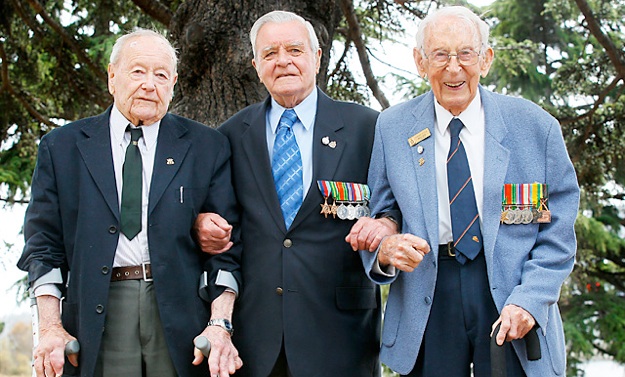
TRIBUTE: Yesterday's memorial unveiling was a proud moment for surviving members of the 2/40th Battalion, from left, Jack Bone, Lloyd Harding and Doug Jack, all of Hobart. Picture: NIKKI DAVIS-JONES
A SIMPLE stone memorial to Tasmania's 2/40th Battalion was unveiled in Hobart yesterday, 71 years to the minute after most of its members were taken prisoner by the Japanese army.
Just three survivors of the World War II unit were at the ceremony.
One of them, Doug Jack, 92, of Rosny, said seeing a permanent memorial dedicated to his mates was one of the most important moments of his life.
"It should have happened when we got home," he said. "I'm very proud and very lucky to be here."
With fellow veterans Jack Bone, 93, and Lloyd Harding, 91, he helped draw back the cloth on the stone plinth, erected at a carefully chosen spot on the Domain, overlooking the city.
Buried under the memorial was a scroll with the names of all 919 members of the 2/40th Battalion, 271 of whom died in combat or as prisoners of war.
A large crowd gathered to read the inscriptions and place sprigs of rosemary on the sandstone base.
A memorial garden in Launceston was dedicated to the 2/40th at the same time.
The battalion was almost entirely Tasmanian and, after months of training at Brighton Army Camp, it joined a detachment called Sparrow Force, sent on an impossible mission to defend the island of Timor from imminent Japanese invasion.
In February 1942 they were confronted by a force of 23,000 Japanese troops.
After four days of heavy fighting, cut off, low on supplies and completely outnumbered, most of Sparrow Force had to surrender.
Doug Jack said his leg was "smashed up" on the first day of fighting and he was in the back of an ambulance when the surrender happened.
He spent the next 3 1/2 year in a prison camp in Java.
Other battalion members were sent to various parts of Asia to work as forced labour, on the Thai-Burma railway, in Singapore and Japan itself.